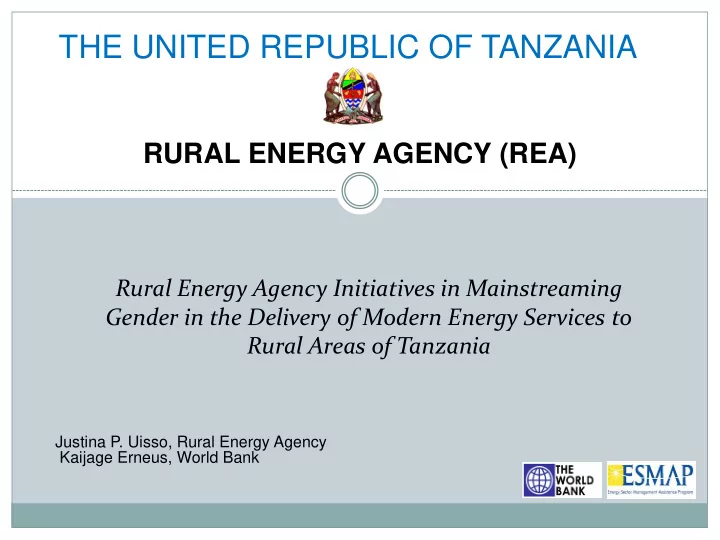

THE UNITED REPUBLIC OF TANZANIA RURAL ENERGY AGENCY (REA) Rural Energy Agency Initiatives in Mainstreaming Gender in the Delivery of Modern Energy Services to Rural Areas of Tanzania Justina P. Uisso, Rural Energy Agency Kaijage Erneus, World Bank
Background on REA Projects promoted & supported by the REA: Grid Extension; Off-grid; Key issues to address throughout: Small hydropower • Affordable connection Mini grid; costs • Promotion of low cost Grid/ Mini grid design for rural Green field electrification Solar Packages/ • Energy regulation • Promotion of efficient Solar lanterns; cooking solutions Wind; Biomass; and Energy efficiency. Technical Assistance to project developers
Why gender m atters in rural electrification projects? Men and women have different roles in the home and community, and different energy uses, varying among groups. Who are the primary users of the following energy services Cooking Lighting Heating Television Local Ironing brewing Women’s work is often biomass and metabolic energy intensive: Time consuming to gather firewood and water Often unhealthy (i.e., indoor pollution – inferior energy type fires caused by use of kerosene and weak lamps, candles etc Men are often the decision-makers when it comes to purchasing/ changing domestic energy use and access Gender mainstreaming in REA focuses on the 3E’s: Equality, Equity and Empowerment Strategies: gender specific, gender neutral and gender transformative
REA’s Progress on Gender INFORMAL : In the past, REA has been working informally on gender issues in but not in a very systematic manner (i.e. no clear objectives, plans or targets) through training on improved stoves, kilns, etc SYSTEMATIC: Currently, REA is embarking on a comprehensive gender and energy assessment process in fulfilment of its mandates as required by national policies on gender, energy, among others
The Approach Part I: Organizational Assessm ent Carrying out a gender assessment of REA as an organization, including a needs assessment for capacity building and training Comprehensive review of the key and strategic • GENDER documents of REA from a gender perspective ACTION Gender survey of REA management and staff • PLAN Focus group discussions and interviews • Part II: Project Assessm ent Conducting a gender and energy needs assessment within selected villages and REA-supported projects Field Visits
Sum m ary of Progress to date The Study: launched October 2011 with meeting with all members of REA staff and management, chaired by REA DG Staff enthusiastic to participate in assessment, including support from highest levels of REA management A review of strategic plan and other key documents in- progress Early findings: REA strategic plan ‘SP’ (2009/ 10-2011/ 12) has 5 objectives, one of which (objective 4) covers gender it identifies gender as critical and cross -cutting issue and calls for its mainstreaming
Early findings…. However, critical gaps in SP: It adopts a weak definition of gender (e.g. focuses on the number of women participating in energy activities). It also fails to provide em pirical solutions and recom m endations for how to mainstream gender in REA policies and practices. Indicators are rather general and quantitative, e.g. % of women participating in energy project.
Early findings…. REA Mandates that provides entry points for mainstreaming gender The National Energy Policy, (20 0 3) o Calls for efforts to address gender imbalance by undertaking deliberate gender considerations at all levels of the energy sector including electricity (e.g. demand/ supply chain, planning and decision making) (sections 2.1, 2.2) o Section 5.6 sets 4 policy statements geared to promoting gender equality, facilitate training, promote awareness and advocacy on gender issues
Early findings… Rural Energy Act 20 0 5 Section 16 (c ) of the Rural Energy Act 2005 requires REA to prepare application procedures, guidelines, selection criteria, standards and terms and conditions for grants and submit to the Board for approval. Using this m andate REA can opt to include a criteria on gender considerations by all project proposals 16 (d) requires REA to select projects for evaluation and contract suitably qualified persons to evaluate their social and economic impacts. As previously using this m andate REA can introducing a gender-sensitive criteria in selection, appraisal and of energy (electricity) projects 16 (e) Requires REA to recommend to the Board projects for approval. Sam e as above
Expected Outcomes Gender and Energy Strategy developed for REA based on evidence and findings of assessments and supported through detailed gender action plan REA program and activities have integrated gender components and activities through support of gender sensitive indicators and M&E Capacity developed within REA to provide sustainable gender responsive expertise and guidance and contribute to gender integration at the national level Policy Dialogue for gender sensitizing national energy policy programs In sum m ary, a system atic approach of integrating gender into policies and program s for the Governm ent of Tanzania’s energy sector.
Recommend
More recommend